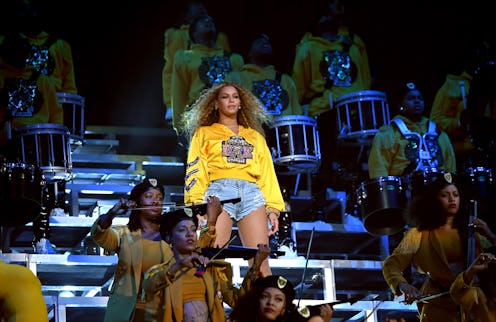Life
The Real Issue With Beyonce’s Plant-Based Eating Challenge, According To A Nutritionist

On the evening of Jan. 30, Beyoncé fans swiped open their phones to a surprising Instagram from Queen B, challenging fans to switch to a plant-based eating plan for a chance to win free tickets for life to either her or Jay-Z’s concerts. (OK, so it’s only up to 30 years. And it’s only one concert per tour. But still.) The Instagram post followed up a challenge laid out by Bey and Jay in their forward to The Greenprint, by Beyoncé’s personal trainer, Marco Borges. “We all have a responsibility to stand up for our health and the health of the planet,” the duo, who are famous for their longtime support of a vegan lifestyle, wrote.
While the contest’s official rules don’t mandate or track entrants’ adherence to a plant-based lifestyle, and the challenge’s website suggests options as varied as “Meatless Mondays” to “All plants. All the time,” nutritionists say that associating any food-based challenge with an external motivation can make complicate someone's relationship with what they eat.
“Offering incentives for making significant changes to diet is a misguided way of encouraging people to embrace a healthy lifestyle,” Joyce Faraj, PhD, RDN, CDN, a nutritionist at Mountainside, tells Bustle. “In order for a lifestyle change to truly be beneficial, physically and emotionally, it must come from within.”
To be fair, a plant-based lifestyle — one that doesn’t necessarily exclude animal products, but that primarily, as the name notes, uses plants for fuel — has myriad benefits. A recent report suggested that plant-based eating might be the basis of a “planetary health diet,” aka a food plan that has as little impact on the planet as possible. “Plant-based diets can help lower cholesterol and blood pressure as well as decrease a person’s risk of developing chronic diseases such as diabetes, cardiovascular disease, and cancer,” Faraj says. She adds that plant-based eating is higher in fiber, which can be good for both your gut and mental health.
But, as many people on Twitter have pointed out, a plant-based lifestyle isn’t necessarily accessible to everyone. For people who live in food deserts, or a geographic area where at least 500 people live more than a mile from a supermarket, according the USDA, nutrition may be more accessible in the form of processed food supplied by bodegas or gas stations. For people who rely on food assistance programs, buying processed food may be a more efficient way of getting your family’s necessary calories compared to buying higher-priced fresh fruits and vegetables; that is, if SNAP users even buy more so-called "junk food" than non-SNAP users, which researchers say is a myth that stigmatizes low-income people.
Regardless, the primary issue with Beyoncé and Jay-Z’s challenge is that, well, no one should tell anyone else how to eat, period. “While consuming plant-based foods can be more nutrient-dense, the idea that a person has to consume a certain type of food to properly nourish themselves is problematic because nutrition is not one-size-fits-all,” Faraj says. “Before broadly encouraging people to start a plant-based diet, it’s important to realize that in addition to internal factors or desires to eat a certain way, environmental, cultural, and socioeconomic factors influence food consumption as well.”
Again, Beyoncé and Jay-Z are only directing their fans to a website that lists potential benefits of a plant-based lifestyle, where they can enter their name and email for a chance to win. (I did this without any commitment to eat plant-based.) No one is forcing anyone else to go vegan, or even eat one more vegetable a week. But anyone who’s spent any time in the world knows that women in particular face way too many messages about what we put in our bodies. No one needs another celebrity suggesting you change your entire lifestyle, no matter how involved, in exchange for anything.